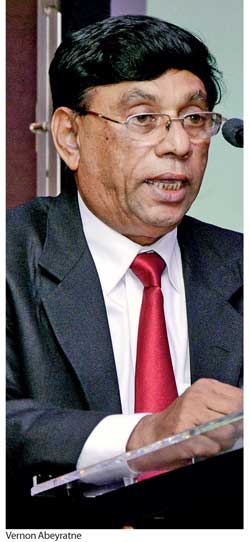23 Aug 2016 - {{hitsCtrl.values.hits}}
Following is the full speech by Spices and Allied Products Producers Association (SAPPTA) Chairman Vernon Abeyratne, delivered at the SAPPTA AGM held at Ramada Hotel, Colombo recently. 
First of all I thank the Management Committee of Spices and Allied Products Producers Association 2016/2017 for placing your confidence for re-electing me to be the Chairman to guide this prestigious organization for another year. During the past year we made a number of representations to various government organizations to sort out the issues relating to our industry and members.
We were successful in getting the Export Cess removed on spices since November 2015. This made our spices more competitive in the world market and exporters are in a position to offer higher prices to the farmers. Pepper prices have increased from Rs. 1000 to Rs. 1350 per Kg in a year. It is interesting to note that Sri Lankan pepper is getting US$2000 premium over Vietnam origin pepper because our pepper is of high quality and pesticides not used.
We have 32000 hectares under pepper cultivation and our yield is around 1150 Kgs per hectare. But Vietnam production is twice this quantity.
Meeting world demand
We have to increase our yield and expand our plantations in order to meet the increasing world demand. We are proud to mention that Malwatta Valley Plantations, one of our members has planned to obtain a crop of 5000 M/tons Black Pepper in the year 2025 under the guidance of SAPPTA and with assistance from Department of Export Agriculture. The recently concluded international pepper community conference in Indonesia predicted that the world needs an additional 80,000 M/tons of pepper by year 2025 and the demand is increasing 10,000 M/tons per annum.
The Department of Export Agriculture which is working very closely with us to develop the spice industry, and has been working hard to increase productivity. We hope we will be able to double our production by the year 2020.
We have 15 plantation companies as our members and they are engaged in spice cultivation, but facing investment problems. I understand that Ministry of Primary Industries has new programs to assist the plantation of spices. These programs will benefit plantation companies to grow more spices. In the past, spice plants were given free-of-charge by the Department of Export Agriculture, but this facility has now been withdrawn. This will have an adverse effect on new plantations. We would like if this matter is looked into.
As exporters, we are well aware that marketing of spices is not a problem.
But, the issue is concerning low production in our country.
At the present rate, we will be able to achieve US$ 1 billion from the spices and allied product sector by year 2020.
Spice quality
We all agree that we have to offer quality spices to the world in order to get better prices in niche markets. But I must emphasize that quality control should be done at the small processing centers by educating farmers with the assistance of Sri Lanka Standards Institution.
The cap of 2500 tonnes imports to India from Sri Lanka imposed by India after the signing of the Indo Sri Lanka Free Trade Agreement continues to remain despite several representations made by our Government.
The spice industry in Sri Lanka hopes that with the signing of the new agreement between India and Sri Lanka, this non-tariff barrier will be removed.
However pepper exports to India continued under the Indian Advance License systems for value addition.
A detailed study needs to be undertaken by your Ministry in order to ascertain what commodities we should concentrate.
Another important spice is cinnamon. We are glad that plantation companies are taking interest in growing cinnamon. One has to be cautious in going into cinnamon in a big way for three reasons.
Firstly, our dependence is on one market, Mexico, which nearly takes 50 percent of our exports. It is risky if the demand in that market falls.
Secondly, because of the great disparity between the prices of cinnamon and cassia ( our main competitor ) as cinnamon prices have been going up rapidly, we could lose our markets to cassia , this is already happening.
Finally the problem of getting peelers is quite acute.
With all due respect to the government officers who identify the problems of the exporters, in the right spirits I must mention that there are some officers who have a bureaucratic approach which is not helpful at all, to increase the Sri Lanka index of ease of doing business. This problem should be properly identified and quick addressed to ensure the smooth functioning of exports of spices and other products from this country.
25 Nov 2024 4 hours ago
25 Nov 2024 5 hours ago
25 Nov 2024 5 hours ago
25 Nov 2024 6 hours ago
25 Nov 2024 7 hours ago